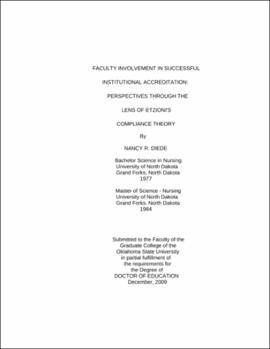| dc.contributor.advisor | Hyle, Adrienne | |
| dc.contributor.author | Diede, Nancy R. | |
| dc.date.accessioned | 2013-11-26T08:34:22Z | |
| dc.date.available | 2013-11-26T08:34:22Z | |
| dc.date.issued | 2009-12 | |
| dc.identifier.uri | https://hdl.handle.net/11244/7370 | |
| dc.description.abstract | Scope and Method of Study: This is a qualitative study about faculty engagement with their college's and university's assessment programs viewed through Etzioni's Compliance theory. | |
| dc.description.abstract | Findings and Conclusions: All three educational institutions visited were perceived as using normative power when viewed in relation to assessment. Two of the institutions used both normative and remunerative power. The use of two or even all three types of influence (normative, remunerative and coercive) are not an unexpected finding (Etzioni, 1968). When normative power was used, participants from all three institutions were able to provide examples of moral involvement with assessment. Faculty engagement had occurred because it was the right thing to do and their involvement was recognized and praised by the administration. In the matter of assessment, all three organizations used their normative power in an effective manner. | |
| dc.description.abstract | When remunerative power was used some participants responded with calculative behavior while others did not. This incongruency generally does not lead to an effective organization (Etzioni, 1975). Only one institution was perceived as using some form of coercive power. The expected alienative response may have been observed but overall the institution was not described as using primarily coercive power in order to motivate faculty to become involved with assessment. | |
| dc.description.abstract | Additional analyses of the participants' responses to the questions corroborated the importance of a faculty driven assessment program with support and collaboration between administration and faculty (Cross 1997; McEady, 2006; Priddy, 2007). Faculty who were engaged with assessment were cognizant of the value of assessment and its relationship to the accrediting agencies and stakeholders call for accountability of student learning. | |
| dc.format | application/pdf | |
| dc.language | en_US | |
| dc.rights | Copyright is held by the author who has granted the Oklahoma State University Library the non-exclusive right to share this material in its institutional repository. Contact Digital Library Services at lib-dls@okstate.edu or 405-744-9161 for the permission policy on the use, reproduction or distribution of this material. | |
| dc.title | Faculty involvement in successful institutional accreditation: Perspectives through the lens of Etzioni's compliance theory | |
| dc.contributor.committeeMember | Mendez, Jesse | |
| dc.contributor.committeeMember | Bull, Kay | |
| dc.contributor.committeeMember | Harris, Ed | |
| osu.filename | Diede_okstate_0664D_10695.pdf | |
| osu.accesstype | Open Access | |
| dc.type.genre | Dissertation | |
| dc.type.material | Text | |
| thesis.degree.discipline | Higher Education Administration | |
| thesis.degree.grantor | Oklahoma State University | |
